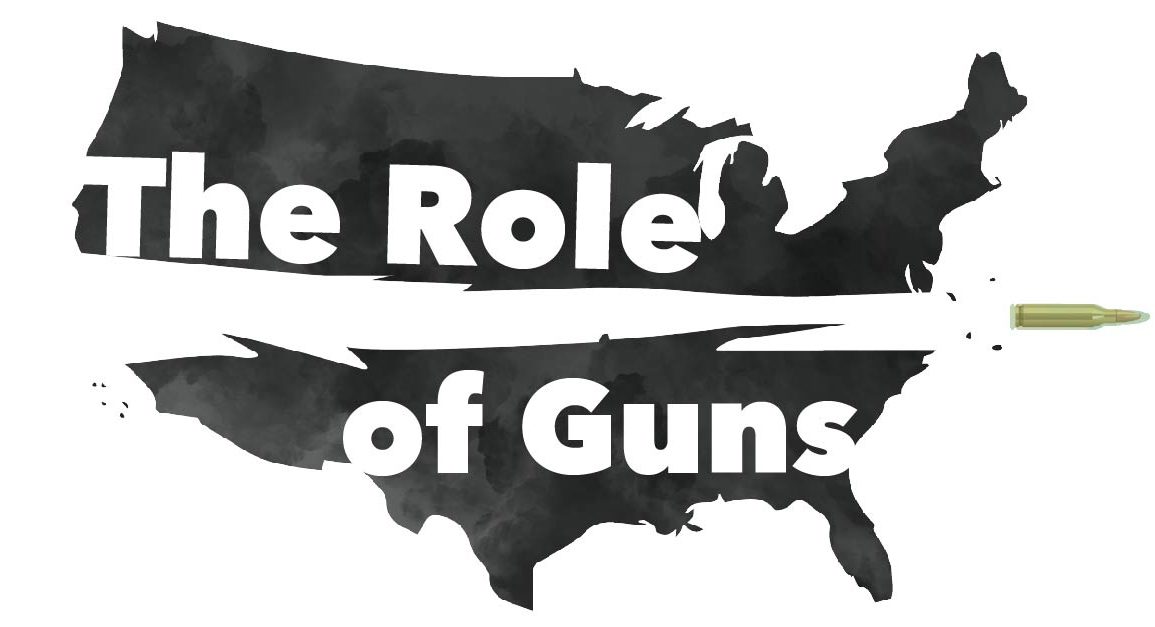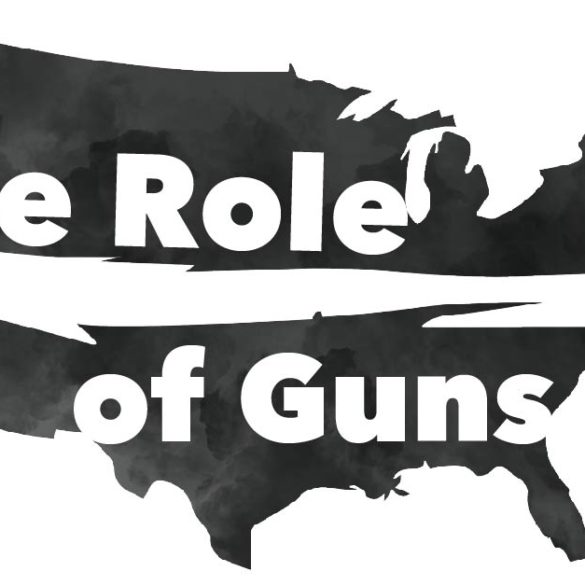For some Americans, the second amendment is a basic right. For others, it needs to be reevaluated.
In 1620, the Pilgrims sailed to America aboard The Mayflower, bringing only their most treasured items with them to the new country. Historians believe amongst all of the keepsakes and family heirlooms stored away below deck, the Pilgrims brought their firearms.
Guns have long played an important role in the history of America. Oftentimes, firearms are viewed as symbols of freedom and power in our country. Looking back, it is no surprise that guns are seen in this light. From early explorer Christopher Columbus sailing to America on his ship loaded with cannons, to early settlers using guns to hunt and kill animals to feed their families, as well as “The shot heard ‘round the world” that initiated the American Revolution, guns have often been associated with the American ideology of liberty and patriotism.
In recent years, guns have been spending a lot of time in the public eye. However, much of this attention has been negative. Within the last twenty years, there has been an outbreak of mass shootings across our country. In 1999, thirteen individuals were killed and twenty-four were injured at the Columbine High School shooting in Colorado. Later, in July of 2012, twelve were killed and fifty-eight were injured at a movie theater in Aurora, Colorado. Then, in December of 2012, a gunman entered Sandy Hook Elementary School and proceeded to shoot twenty first-graders and six adults. And yet again, this past June, forty-nine people were killed while dozens others were injured at a nightclub in Orlando, Florida—making it the deadliest mass shooting to ever occur on U.S. soil.
Around 37 percent of American adults own a gun in their household, according to Pew Research. Many have urged the American government to create stricter laws on obtaining guns. Some have even pleaded that firearms be banished once and for all. However, opposing sides have argued that guns cannot be taken away, stating that it would violate the second amendment of the American Constitution.
To better understand why there are such strong opposing sides on this topic, Ball Bearings sat down with a military veteran, several students, a member of Moms Demand Action for Gun Sense in America, and the president of Hoosiers Concerned About Gun Violence.Their responses indicate how guns have affected their lives personally as well as what role they think guns play in American society.
Greg Lane
Greg Lane is a veteran of the U.S. Marine Corps Infantry. After serving for seven years and being deployed at various locations around the world, Greg came to Ball State to study nursing.
The first time I shot a gun, I was fifteen. Some friends and I were out hunting squirrels. I don’t remember a lot of stuff from when I was a kid after being deployed.
You have to keep in mind that some of the most gun-strict cities in the country have the highest murder per capita by guns, so I don’t really believe in any manner of restricting reasonable gun owners. If [the American government] were to have the concept of ‘if we ban guns, people will stop owning them,’ they should probably focus on making forks illegal so they can stop making people fat. Their concept behind ‘if we ban it, people won’t do it’ is really stupid because murder and drugs are illegal and good, wholesome citizens do neither one of those things. So, if you put a ban on guns, all you’re doing is taking guns out of respectable, wholesome, law-abiding citizens. Therefore, it doesn’t do any good.
Catherine Bolten
Catherine Bolten is an associate professor of Anthropology and Peace Studies at the Kroc Institute for International Peace Studies at Notre Dame University.
Well, I guess I was a small child when I first saw a gun on TV. So that would be about thirty-five years ago. It was probably on the TV show MacGyver. I watched that a lot when I was younger.
I see guns as a threat to the health and safety of every single American. Whatever people are to say about their right to own a gun, loss of life that occurs from gun violence far outweighs the arguments being made on the side of people’s rights to protect themselves with guns. You can protect yourself in other ways. And actually, statistics have shown that owning a gun makes you four times more likely to be shot with one than if you don’t have one. So it’s the mere presence of guns that increases the possibility that someone is going to lose their life. And even if people, who hold that the second amendment is sacred, if they didn’t have guns in their homes, they would be much less likely to be victims of gun violence.
Julius Kovacs
Julius Kovacs is a sophomore at Ball State University studying telecommunications and legally owns a gun.
Well, [I’ve seen guns] in media and just in games. I played a lot of games [with guns in them] when I was younger, and [I saw guns] in movies, of course. But the first contact with an actual gun besides toys and stuff was at a shooting course with my mom about safety. It was shotgun shooting with clay pigeons. That was when I was around ten. I think the roles of guns in America are obviously self-defense, sporting, and then hunting. I think the concept, for me, is that this entire nation was kind of founded on [guns]. The colonists were allowed to have their own guns, and that’s why this country is around. It’s a national identity sort of thing. But, I think self-defense and all those other things are still relevant today.
Erika Jagger-DeHeer
Erika Jagger-DeHeer is a longtime volunteer with the Indiana chapter of Moms Demand Action for Gun Sense in America.
The first memory that I have of coming into contact with a gun would be as a young girl, probably at the four or five age range. My uncle was a police officer in Chicago, and when we had family events, he would arrive in uniform and would obviously be carrying his service weapon. I don’t own guns, but several of my friends and family members do, and I support their right to do so—as does the organization that I’m a part of, Moms Demand Action for Gun Sense in America.
The roles that guns play in their lives range from recreational hunting, to being active in the military, to keeping a weapon for self-defense. As volunteers within the gun-violence prevention movement we advocate for laws, such as universal background checks, that support the Second Amendment and keep guns out of the hands of convicted felons. So, even though the roles that guns play in our individual lives vary widely, the vast majority of us believe that common-sense safety measures like universal background checks and preventing child access to guns can, and should, go hand-in-hand with our right to own them. And my role is to help get those measures in place.
Ed Smith
Ed Smith is the president of the organization Hoosiers Concerned About Gun Violence. His response was received via email.
My first encounter with guns was in the Navy during the Vietnam war. I do not own a gun, but feel that guns are for sports, including hunting, and for protection of one’s home. Hoosiers Concerned About Gun Violence is focused on education and state legislation. With a legislature consisting of approximately 80 percent Republicans, we are unable to get gun control bills to move forward for debate. As a result, we are trying to get a bill introduced in the 2017 legislature that would ban the open carry of assault weapons on our streets. We don’t feel that we could get a ban on assault weapons this year and therefore we are proposing a ban on only the open carry of assault weapons.
Guns are a means of protection, can help to provide food and other essential supplies for families, and can be used for various recreational sports. However, guns can also be used for senseless crimes such as mass shootings and the killing of unarmed civilians. The call for reform stems from these fears, but others fear losing guns altogether.
Ball Bearings has edited statements for clarity.




